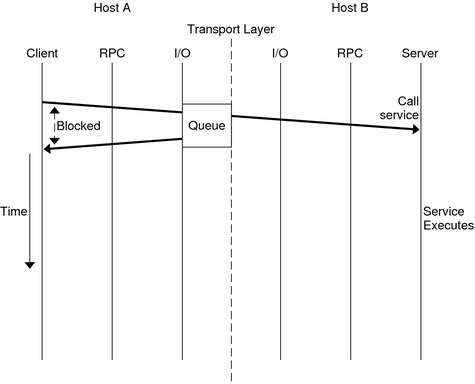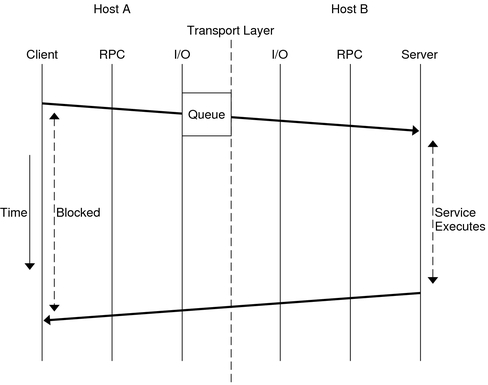One-Way Messaging
In one-way messaging the client thread sends a request containing a message to the server. The client thread does not wait for a reply from the server and is free to continue processing when the request has been accepted by the transport layer. The request is not always sent immediately to the server by the transport layer, but waits in a queue until the transport layer sends it. The server executes the request received by processing the message contained in the request. This method saves processing time.
The following figure illustrates one-way messaging.
Figure 8-1 One-Way Messaging

In previous versions of the Oracle Solaris RPC library, most requests were sent by two-way messaging. In two-way messaging, the client thread waits until it gets an answer from the server before continuing processing. If the client thread does not receive a reply from the server within a certain period of time, a time-out occurs. This client thread cannot send a second request until the first request is executed or until a time-out occurs. This messaging method is illustrated in the following figure.
Figure 8-2 Two-Way Messaging

Previous versions of the Oracle Solaris RPC library contain a second method of messaging called batching. In this method, client request are held in a queue until a group of requests can be processed at the same time. This is a form of one-way messaging. See Chapter 4, Programmer's Interface to RPC for further details.
After the transport layer accepts a request, the client is not notified of failures in transmission and does not receive a receipt from the server from the request. For example, if the server refuses the request due to an authentication problem, the client is not notified of this problem. If the transport layer does not accept the request, the sending operation returns an immediate error to the client.
If you need to check whether the server is functioning correctly, you can send a two-way request to the server. Such a request can determine whether the server is still available and whether it has received the one-way requests sent by the client.
For one-way messaging, the clnt_send() function has been added to the Oracle Solaris RPC library, and the oneway attribute has been added to the RPC grammar.